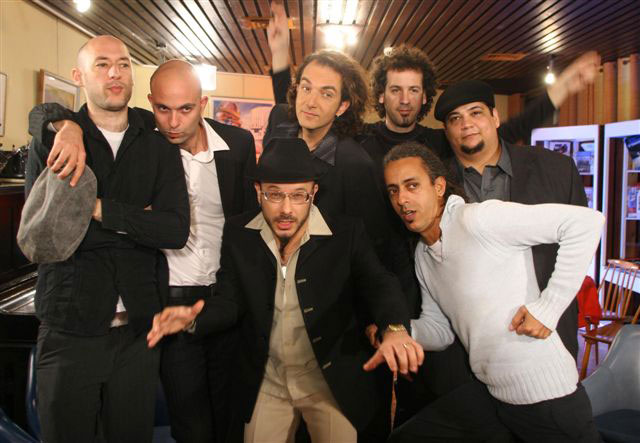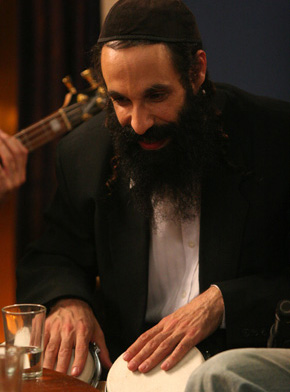Tippex on Emptiness: The Transformation of Tamir Yemini
25 years ago, the band Tippex stormed into the Israeli mainstream. Tamir Yemini, one of the band's founders, recounts how a trip to Africa to learn drumming ended up triggering his spiritual journey toward Judaism.

We will need to refill more and more ink pens as we tell the rich and fascinating life story of Tamir Yemini, a member and co-founder of the legendary band Tippex. Yemini grew up and was educated in a communal kibbutz of the 70s, traveled in America, crossed Australia and Africa, and finally, thanks to a small booklet called "Introduction to Kabbalah" that fell into his hands, he strengthened spiritually and accepted the yoke of Heaven.
Having studied under some of the best in the field, including the musicologist Mark Yampolsky, who specializes in African music and jazz, drums, piano, and mandolin were just some of the instruments Yemini mastered from the age of 11. A long list of musicians and creators he played alongside adorns his professional resume, including Yehuda Glantz, Shuli Rand, Jeremiah, Shlomo Katz, Yizhar Shabi, and even Mordechai Ben David.
In high school, he participated in a percussion ensemble that performed at kibbutz events, and at age 17, when his good friend offered to form a band with Kobi Oz, Tippex's lead singer, music became his main occupation. "Before meeting Kobi Oz and the rest of the band members, I used to play music from the '60s, like Jimi Hendrix and Frank Zappa," Yemini recalls. "Since I was used to playing a different genre, it was a bit difficult for me at first to connect with Tippex's style, but over time, it definitely improved."

At age 18, when he joined the army, Yemini left the band, and it continued without him. Upon being discharged, he willingly accepted the offer to return and play as a full member, even though he planned to fly to New York for a post-army trip. "The original plan was to play with the band for a year and save money for the trip, but the time stretched, and instead of a year, I stayed with the band for six years," Yemini shares. "When I decided to finally leave the band, it was already at the peak of its success in Israel. Despite my enjoyment, I never felt it was the peak of my musical aspirations. My inclination in music is completely different, leaning more towards improvised music, a mix of jazz and African music techniques that I learned in my childhood."
What is the Connection Between the African Chief of Malindi and an Israeli Musicologist?
So to say it, you just pack your bags and decide to leave the country?
"Yes, but not only that. The aspiration to reach Africa was driven by an old dream I had since I was 14—to learn to play improvised music professionally. Before flying to New York, I sat with my teacher, Mark Yampolsky, and together we mapped out in detail the path I had to take to reach the African tribe called 'Malindi,' to which he sent me. When I reached the African master, all I needed to say was the magic words: 'Mark Yampolsky from Israel sent me,' to be welcomed with open arms," Yemini's smile broadens from ear to ear.
Do you mean to tell me that some leader of a remote tribe in distant Africa knows your Israeli music teacher? How is that?
Yemini laughs. "Yes. It turns out that Mark and that master of improvised music met once under similar circumstances, formed a connection, and since then, Mark sends his students who want to specialize in improvised music to him."
I know what you're thinking—if it’s improvised music, anyone can 'improvise' it as they please, so why travel all the way to Africa to learn it? I also thought about this. So the truth is that while the music is improvised, the techniques that create it are something that needs to be learned, and best from the best. If Mark Yampolsky thinks so, you can believe him that it's true.

Thus, Yemini reached the African savannah, and there... amidst the wild nature, as he played his life's dream surrounded by primitives wielding improvised instruments, the Jewish spark within him began to awaken and show its signs.
"It was precisely there that I felt the absence of the Land of Israel. Something in the air and the atmosphere conveyed a great impurity and a feeling of lack of blessing in the actions," Yemini recalls. "Suddenly, I—the kibbutznik sabra, who always so championed the idea of equality, who was taught that there is no difference between a Jew and a Chinese—felt for the first time in my life that there is something here. There is something different in me, in us—the Israelis. In the air of the land, in its atmosphere, everything is different." After three months of traveling in Tanzania, Zimbabwe, Namibia, and other countries, Yemini decided to fly to New York, but not before making a short visit to his brother, who lived in Australia then.
The Little Booklet That Led Me to Judaism
Already on the plane on his way to Australia, the first faint signs of Judaism appeared in his life when he asked the flight attendant for kosher food. "I have no idea where this came from," Yemini laughs and continues, "but it sure wasn't the start. In the two years I spent in Israel before flying to Africa, I started fasting on Yom Kippur—a relatively new thing for me at the time. There was always a spirituality about me. When you're involved with music, even as a secular person, you feel something very spiritual. The thing is, until then, Judaism never really attracted me. I wasn't 'anti,' but I also didn't feel the need to explore too far. After the experiences I had in Africa—the lack and impurity I felt there—something opened within me that sort of prepared the ground for what was going to happen in Australia."
And what exactly happened in Australia? Don't tell me you explored all religions until you arrived at Judaism, because you definitely seem like the type who could...
Yemini’s gaze focuses on an invisible point in the room. "Fortunately, my path to Judaism was relatively short, without needing to go through other nonsense before, although I did expose myself to reading the Quran and the New Testament. When I reached my brother, it suddenly became apparent to me that he was interested in Judaism and even started learning Kabbalah—which both amazed and frightened me. True, I was always interested in things related to spirit, but I had my limits, and Kabbalah was one of them. I knew very little about it—but one thing I did know: you shouldn't mess with anything related to Kabbalah; it might be a danger to the soul for anyone who doesn't know how to study it."
What led Yemini to cross that boundary was none other than a small booklet titled 'Introduction to Kabbalah.' "Suddenly, I felt something stronger than me that made me want to open this book. I remember telling myself, 'Let's see what this is all about.'" The fear was replaced by great curiosity, and Yemini found himself drawn into a world of concepts he didn’t think existed in this world—concepts known only to himself. Therefore, reading the book, though fascinating and interesting, brought him to a state of absolute shock.
Why?
"Because suddenly, while reading, I realized that many things written in this book matched the theories I had established for myself from a young age. For example, I always had this thing with mathematical calculations, or what is called gematria—it's information that, although I didn't hear or learn it anywhere, was already within my soul. Before, I might have read books which I considered 'spiritual,' including the New Testament and the Quran, but none of those books ever gave me conclusive evidence for the questions nagging my mind on subjects of utmost importance, like life after death, as this little booklet did. Thanks to this booklet and what I read in it, I slowly came to the realization that the Torah is the truth. It is the truth, the ultimate truth, which I had been searching for all along."
From Satmar's Hassidic Courtyard to a Yeshiva in Tel Aviv
This was the beginning of Yemini's journey back to Judaism, meaning the groundwork for the upcoming developments in his life. After three and a half months in Australia, the moment he longed for more than anything arrived when he received an artist visa for New York, The big apple. There Yemini met musicians from around the world, settled with a steady job in the profession, was invited to play at major events, and was even thinking of settling down. But the events in Australia did not let him rest, and once again, he found himself somehow—it was now or never—on the next stop onupward to house of God. "By that time, I was already on a religious path but still on a 'low flame,’ so to speak. I lived in an apartment alone, in a neighborhood where the nearest Jews to me were Satmar Hassidim, so I found myself turning to them with any questions I had. Thanks to their help, I began lighting Shabbat candles, putting on tefillin, going to synagogue on Yom Kippur, etc." Thus, he gradually strengthened spiritually. Until one day, after two years in New York (during which he fulfilled most of his musical aspirations when he joined bands in the style he loved and created a lot), this period also came to an end.
It's now or never - Yemini felt once more, and for the umpteenth time, he packed his bags, and returned (to where else but) home. "At that time, the horrific lynching in Ramallah occurred," Yemini recalls, "immediately afterward, I was gripped by strong feelings of patriotism and longing for the country. I knew that if I didn’t return now, the success I started to reap in America might blind me and keep me rooted there for many more years, and I didn’t want that. I knew it wasn't the truth, it wasn’t my true place. Additionally, I had just received an offer from my friends in Tippex, to join them for a tour in Israel, so the timing was quite fitting."
And what happens in Israel? A short time after returning from New York, Yemini meets at a wedding of a good friend, who also returned to Judaism, the rabbi who would eventually become his rabbi—the genius Rabbi Mordechai Auerbach from Tel Aviv. "Even after I returned to Israel, I continued to observe the Torah and commandments, but it took me half a year to make the process official and enter a yeshiva as a full-fledged student. That was actually the hardest part of my return to Judaism. As a musician—all my life everything revolved around music, and when I entered the yeshiva, I didn’t really know what I was going towards and what sacrifices this step entailed."
The Reunited Tippex
What truth?
"Knowing what the true purpose of a Jew in this world is, that’s the truth. From the moment I discovered it, I could no longer pretend that I didn’t know, and actually since then, my entire approach to life has changed beyond recognition. As someone who searched for truth all his life, and didn't know what it meant to live in a lie—I felt that the truth is found in Judaism and that I cannot ignore it, or alternatively, escape from the sacrifices I had to make to attain it."
After a year of strengthening in yeshiva, Yemini was blessed to enter into the covenant of marriage with Adi, also a returnee to Judaism, and now the two are parents to six sweet children. A year after the wedding, Yemini started engaging in the music he always dreamed of creating, and since then, he has released approximately one new album every year. "Before, I had many hindrances in releasing my creations," he recalls, "something mainly due to the fact that I worked with many bands, and I was subject to what had to be done—when what I really wanted was to create my own things. Now, when I am fortunate enough to engage in the music style that I truly love, that truly speaks to me—despite the busy schedule and limited time—I genuinely feel the reward of the effort and the belief in the finding."
* * *
To conclude, it's impossible not to talk a little about Tippex (whose initial formation began as a hobby) and the renewed collaboration of the band members, occurring these very days. After seven years without playing together, having tried to develop each in their own way, the band members now reunite and practice for nationwide 'reunion' performances. It's touching to see how before going on stage, the band members gather in a large circle—all except Yemini bareheaded, hugging and saying aloud: "Hashem, open my lips, and my mouth will declare Your praise."
The 25 years since the band was formed flew by quickly. It seems even the old hall of Kibbutz Nachal Oz, where that dusty, rickety piano awaited which the band members first played in 1988, never believed they would return to it. Needless to say, Yemini's feeling regarding the reunion, like the other members, is wonderful. "It's very exciting to be with Tippex once more, after many years of not playing with them. Another thing: back then, I didn’t really connect with the style of music played in the band—today I definitely feel connected, and it’s truly a pleasure," he says.
How did the Tippex members react to your spiritual strengthening?
"Very well, actually. None of them raised an eyebrow in amazement; it didn’t seem strange to anyone when I chose to walk this path. Thank God, we are really good friends, and part of what it means to be good friends is to understand—where it’s easy to judge, it’s to support—where it’s easy to disappear, it’s not to change the friend according to what suits you, according to your value system. Being a friend means knowing how to contain the other as he is, and there's no doubt they knew how to contain me. In fact, to this day they know, and that's essentially what preserves our close relationship."

